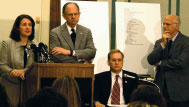Where We Started
One of Steve and Michèle Kirsch's early visions was to cure major diseases. Our initial efforts consisted primarily of sponsoring seasoned university-based research scientists. In our first two years, we granted over $1.5 million towards medical and scientific research through our signature Kirsch Investigator Awards Program.
Milestones
In January 2001, the Foundation committed itself to a new collaborative model at both the philanthropic and investigator levels. We identified and have invested in researchers with multi-year, collaborative grants of $1.5 million over the past three years. We joined with the Glaucoma Research Foundation to spearhead the Catalyst For a Cure for glaucoma. Separately, we continued the Kirsch Investigator Program, with $4.3 million in grants.
In August 2001, President George W. Bush limited federal funding of embryonic stem cell research to a select number of existing stem cell lines. The Foundation decided to engage in lobbying to expand that policy by joining the Coalition for the Advancement of Medical Research (CAMR). We knew that the limitations imposed on this cutting-edge research would restrict the promise of a technology that could potentially cure devastating diseases and conditions such as Alzheimer's, cancer, Parkinson's, heart disease, spinal cord injury, and diabetes.
In 2003, the Foundation reluctantly ended the Kirsch Investigators Program and the collaborative research program due to financial limitations when the existing grants had been paid. We simultaneously determined, however, that we could still play an important role in advancing medical research by lobbying for new technologies such as therapeutic cloning.
Our Current Efforts
Three years after President Bush's decision to limit federal funding for embryonic stem cell research, the Foundation remains committed to the fight to preserve scientists' abilities to conduct cutting-edge medical research techniques. As there has been a stalemate at the national level, we have turned our attention and lobbying to state activities. We supported California's $3 billion Stem Cell Initiative, which will be on the November 2004 ballot, and endorsed legislation including a stem cell registry in California.
|
|
If the potential of stem cell research is realized, it would mean an end to the suffering of millions of people - a rescue, a cure... If stem cell research succeeds, there isn’t a person in the country who won’t benefit, or know somebody who will.”
• Michael J. Fox,
Lucky Man (2002) |
|
 |

U.S. Representatives Diana DeGette (D-Colorado), Mike Castle (R-Delaware), Jim Langevin (D-Rhode Island), and Christopher Shays (R-Connecticut) speak at a joint CAMR - Congressional press conference announcing new legislation to expand current federal policy on funding embryonic stem cell research.
|
|
